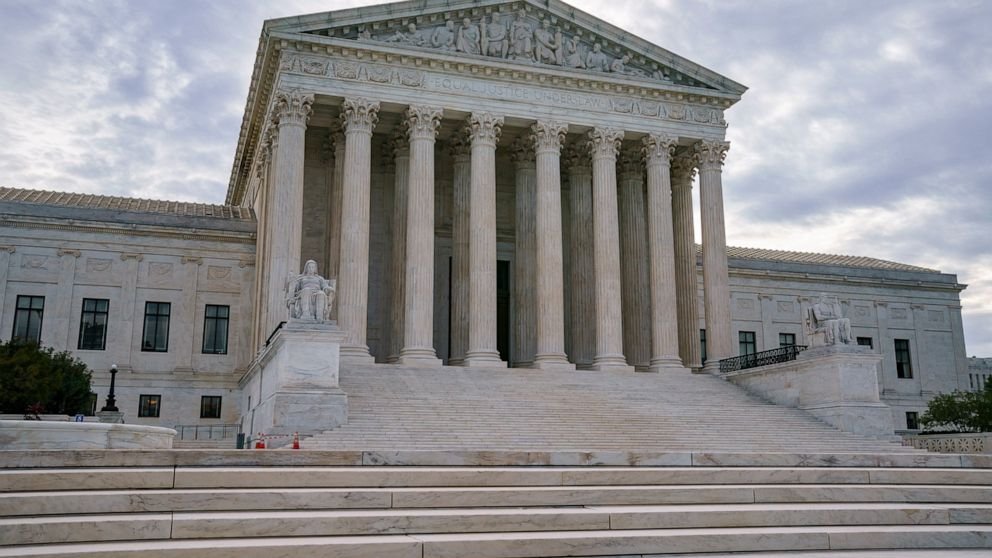The Supreme Court is Set to Hear Some Difficult Cases
The United States Supreme Court building in Washington. Source: ABC News
On the heels of deciding not to intervene in the highly controversial Texas abortion case, the Supreme Court recently began its 2021-2022 session. In the new session, the highest court in the land will hear cases dealing with some highly debated issues — with the most anticipated being the Mississippi abortion law.
The Mississippi abortion case will be a highly contentious case that could be the biggest threat to Roe v. Wade (1973). The law in question, the Gestational Age Act, bans abortions after 15 weeks, with few exceptions. If the Supreme Court decides this law is constitutional, it will reverse Roe v. Wade (1973) and allow each state to make its own laws regarding abortions as there will no longer be a federal standard.
However, let’s look at some of the less publicized — but perhaps equally important — cases set to be heard this term. The court will preside over a range of topics extending from Second Amendment rights to the death penalty. Interesting watches include New York State Rifle & Pistol Association Inc. v. Bruen, Carson v. Makin, and the case of Dzhokhar Tsarnaev.
The court began hearing arguments in the case of Dzhokhar Tsarnaev on October 13. If you are not familiar with Tsarnaev, he is one of the men responsible for the 2013 Boston Marathon bombings, which resulted in three deaths and hundreds injured. The court will have to decide if it should allow Tsarnaev to be executed after the 1st Circuit of the U.S Court of Appeals overturned the execution. The 1st Circuit has two arguments. First, that the judge should have asked jurors about what media coverage they had seen surrounding the case in the lead-up to the trial. Second, the trial judge should have allowed Tsarnaev to present additional evidence for his defense.
If the court upholds the decision reached by the 1st Circuit, Tsarnaev will escape execution and spend the rest of his life in prison. However, if the court reverses the 1st Circuit’s decision, which seems likely, they will reinstate the death penalty, and Tsarnaev will be executed. Interestingly, Justice Amy Coney Barrett pondered the government’s desire to reinstate the death penalty for this case, considering Attorney General Merrick Garland instated a temporary ban on federal executions. This ban may prove difficult for the Biden administration as it will be seen as violating its own standard. Although oral arguments have already begun, it is likely a decision will not be reached until next year.
The next case to watch is that of New York State Rifle & Pistol Association Inc. v. Bruen. This case involves the Second Amendment and could be one of the most critical cases in recent memory regarding gun rights. The issue stems from a New York law requiring people with concealed weapons in public to have a permit. In order to obtain this permit, you must have a valid reason, including self-defense.
The petitioners, in this case, were denied a permit because the licensing agent believed they had not shown enough proof as to why they needed a weapon for self-defense. If the court sides with the petitioners, “may-issue” laws will likely be eliminated, making it easier to obtain a concealed-carry license. Some people fear this will cause an increase in violent crime. Currently, states either have “may-issue” or “shall-issue” laws. “May-issue” laws require applicants to prove why they need a gun, whereas “shall-issue” laws allow applicants to obtain a license as long as they are not legally allowed to have a gun.
Proponents of gun control fear the court will favor the petitioners, especially with the 6-3 conservative majority. They argue that favoring the petitioners could prevent efforts in curtailing gun violence in the country.
A third case this term of particular consequence involves the separation of church and state. In the case of Carson v. Makin, set to be heard on December 8, the court will have to decide whether or not families can use state-granted tuition to pay for Christian private schools that will use the money for teaching religion. The 1st Circuit ruled in favor of the state in this case, arguing that religious schools could not be excluded due to their affiliation with a specific church but that they could be excluded if the tuition would be used for religious instruction, as the tuition is from tax-payers.
The court will have to determine which restrictions are allowed and whether or not the state is allowed to have a law preventing the use of tax-payer money in financing Christian private schools. Ultimately, the court will have to evaluate the religious freedom clauses and the equal protection clause to make their ruling.
The Supreme Court has a full docket this term with cases that will undoubtedly be influential on policy for years to come. It is unlikely that these cases will receive as much coverage as the Mississippi abortion law; however, they are equally important.

